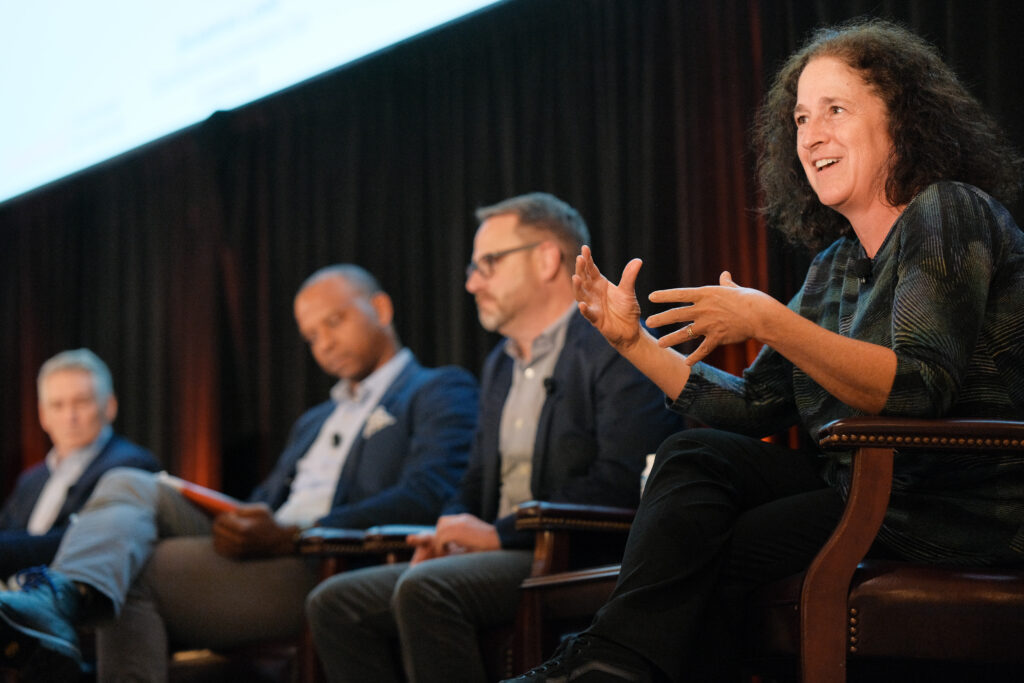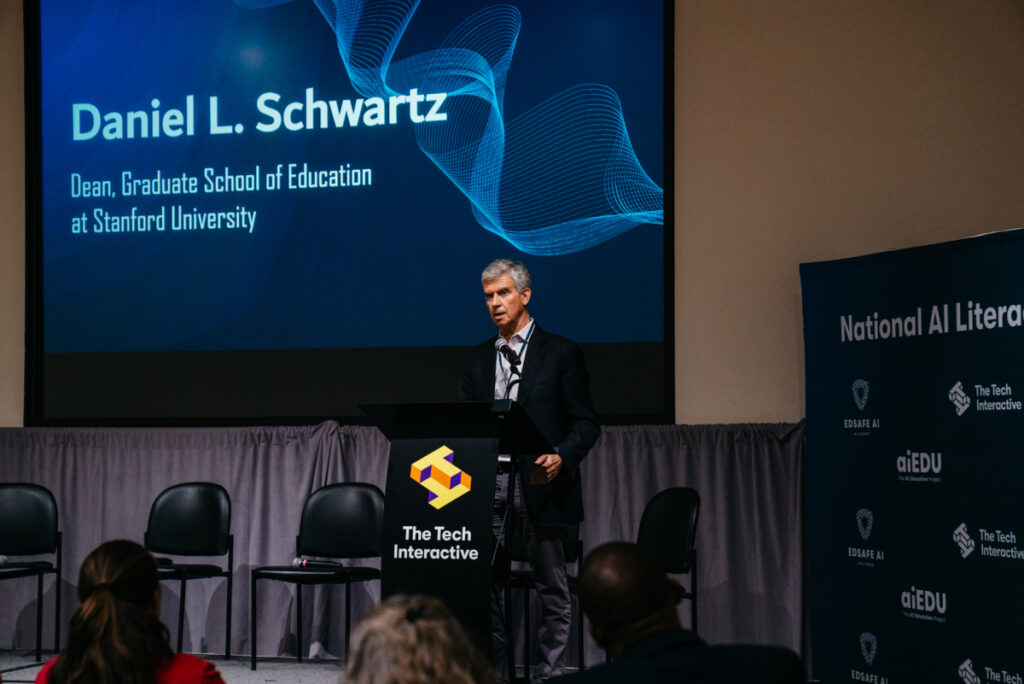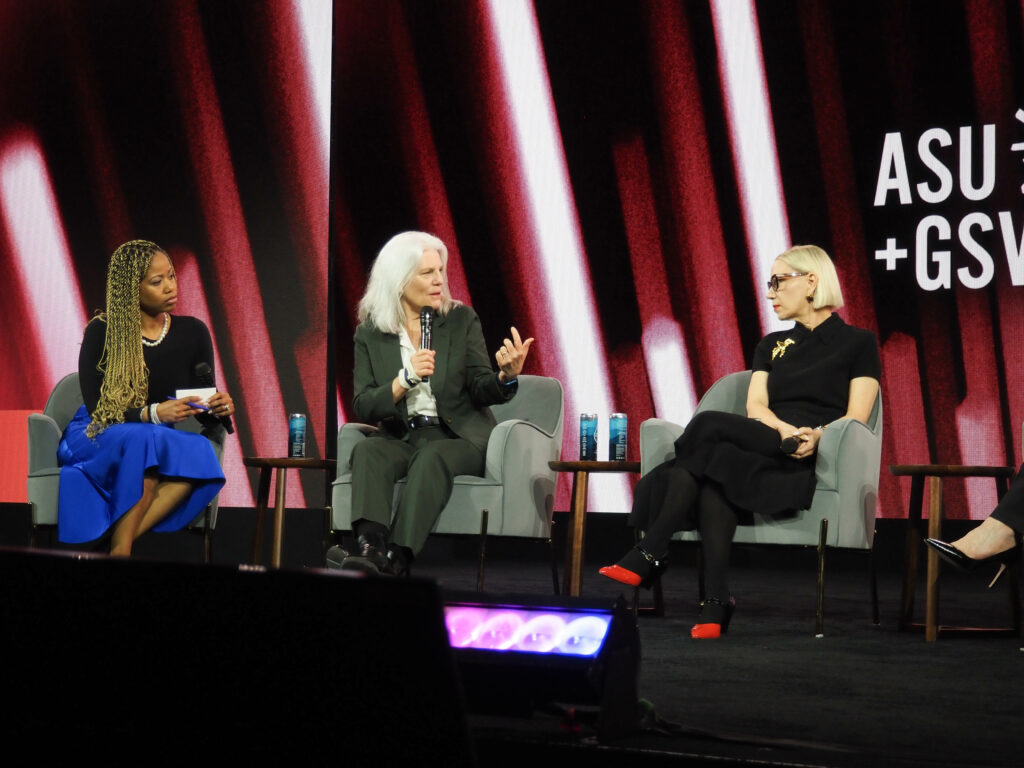When students who are now in kindergarten enter high school, what will their classroom look like? That was a question Stanford Graduate School of Education Dean Dan Schwartz asked Los Angeles Unified School District superintendent Alberto Carvalho during a fireside chat at the the first Stanford Accelerate Edtech Impact summit on Nov. 8.
Carvalho generated a knowing laugh from the audience with his reply: “Who knows?”
The Accelerate Edtech Impact summit, hosted by the Stanford Accelerator for Learning, of which Schwartz is the faculty director, brought together researchers, educators, edtech entrepreneurs, funders, and Stanford students to work toward a future of learning supported by technology that is effective, equitable, and responsive.
Closing the event with insights from the superintendent of the second largest school district in the United States was intentional. During the pandemic, U.S. schools received $190 billion from Congress and spent millions on edtech solutions, many of which were not evidence-based and fell short in supporting student learning. Fostering connections between “unusual suspects,” and bringing in the expertise of researchers and educators to build a better future of edtech, was an explicit goal of the invitation-only event, which drew nearly 400 participants from across the country and beyond.
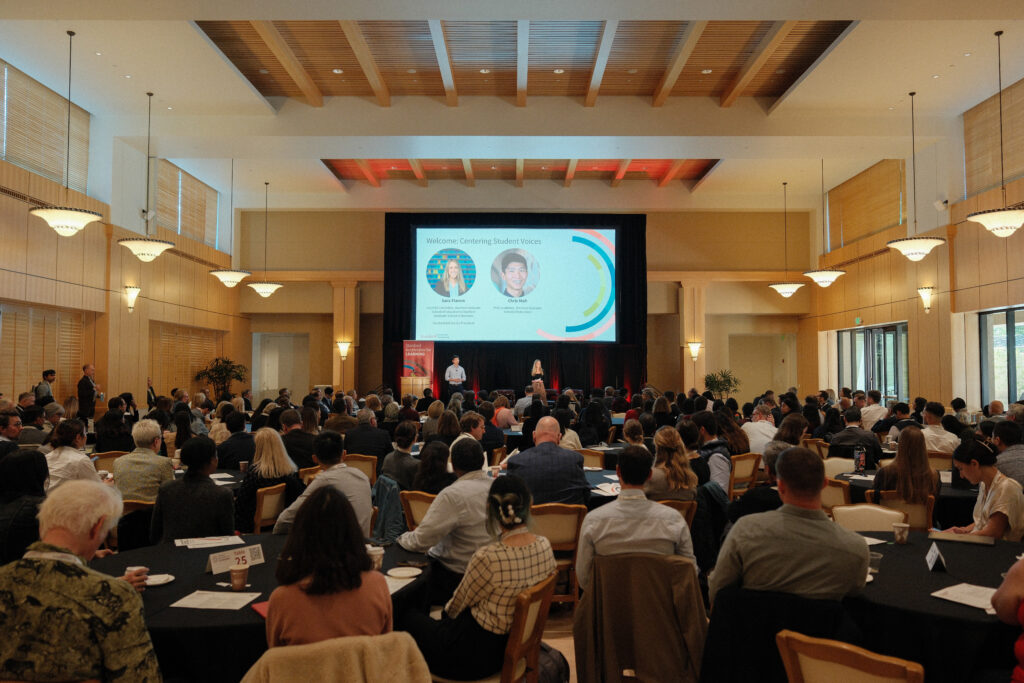
The event featured panels, breakout sessions on a diverse range of topics, and the closing fireside chat. Getting this particular set of stakeholders in the same room is rare, and as Carvalho hinted, most of the conversations brought up more questions than answers. However, asking the right questions is often the first step to systemic change.
Following are some of the key questions that emerged from the summit, and explorations of how stakeholders across sectors are approaching them.
How is artificial intelligence changing edtech?
The broad availability of generative AI technology over the past year has fundamentally shifted the types of tools that can be developed and the conversations in edtech circles. Julia Stiglitz, co-founder and CEO of AI-supported upskilling platform Uplimit, predicted, “Right now, we are an ‘AI and education company,’ but a year from now we’ll just be an ‘education company.’ Every company is going to have AI baked into it.”
Researchers, educators, and entrepreneurs alike noted possible uses for AI tools that complement or enhance effective teaching practices.
“We know what works in learning on average, but to really make principled instructional differentiation decisions, that’s where the power of AI can support,” said Candace Thille, faculty director for the Adult & Workforce Learning initiative at the Stanford Accelerator for Learning. “It can help us get to the true personalization question: For this learner, trying to learn this thing, in this context, what is the best thing for this learner to do?”
Victor Lee, faculty lead for AI + Education at the Accelerator, sees AI as a way to support teachers: “How can we make AI tools that make teachers' lives better? How can we make it so that they can get back to teaching again, what brought them into the profession? Not to replace them, but to give them the time to do the work that only teachers are capable of doing.” He called for the development of AI tools in little-explored areas: supporting learners with disabilities and multilingual learners, and innovations to subjects like art, geography, and physical education.
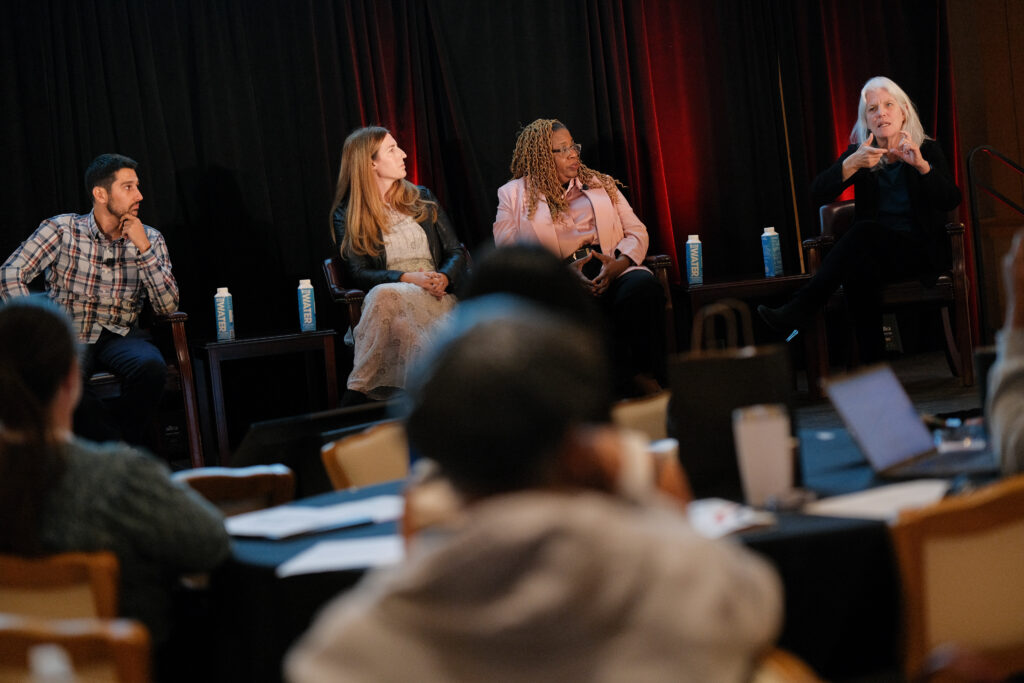
Participants were largely in agreement that AI will never replace the human connection, community, and educator-student relationships that are crucial to learning. Valora Richardson, director of digital solutions and innovation at UNCF (United Negro College Fund), works with HBCUs to keep faculty, administrators, and students involved at every stage as AI tools are developed. “Human connection is the secret sauce of HBCUs’ success,” she said. “They have a unique culture that empowers the students after they graduate, and we need to stay attentive to those voices. AI can’t replace that.”
How might edtech exacerbate or mitigate inequities in education?
Recent years have seen a sea change in the edtech sector, with technology becoming increasingly accessible through widespread adoption of smartphones and government support for internet access. However, there are still many cases in which new education technologies, particularly those backed by evidence, are more widely available to privileged students.
Jennifer Carolan, co-founder and partner at edtech investment firm Reach Capital, noted that the “digital divide” has shifted; while previously, many low-income students lacked devices or connectivity, teacher shortages have resulted in schools with fewer resources often relying on virtual teachers.
“The premium learning experience is now the human touch,” she said.
In a session entitled “Reaching the most underserved learners globally,” researchers and entrepreneurs alike noted the importance of collaborating with local communities when developing edtech tools in contexts where resources are scarce. Every researcher and founder on the panel cited local partnerships with governmental and non-governmental organizations to embed their work, and called for a change in the “top-down” approach researchers and companies often use.
Amin Marei, senior director of Impact and Efficacy at Sesame Workshop, highlighted agency, transparency, and accountability as key tenets of his organization’s work in refugee camps. Joe Wolf, co-founder and co-CEO of Imagine Worldwide, builds learning tools for literacy and numeracy in seven countries in sub-Saharan Africa. Many of the schools have unreliable electricity, let alone internet access, so his team crafts products that can work offline or using solar energy, and constantly iterates on them with feedback from teachers and learners.
How could the research community, edtech, and schools work together differently?
Increasingly, learners, parents, and districts are asking edtech companies: is your solution designed based on learning science, and is there evidence that it works? The necessity for edtech to be research-backed is a seismic shift for the sector, and has driven collaboration with researchers.
Carolan said that Reach Capital encourages entrepreneurs to hire education experts, including teachers and researchers, for their founding teams. Matt Wayne, superintendent of San Francisco Unified School District, took it a step further. “I appreciate the comments about having educators at the table – but also, where is the table going to be located? Educators have so much on their plates right now, but we are also trying to build the structures for learning.”
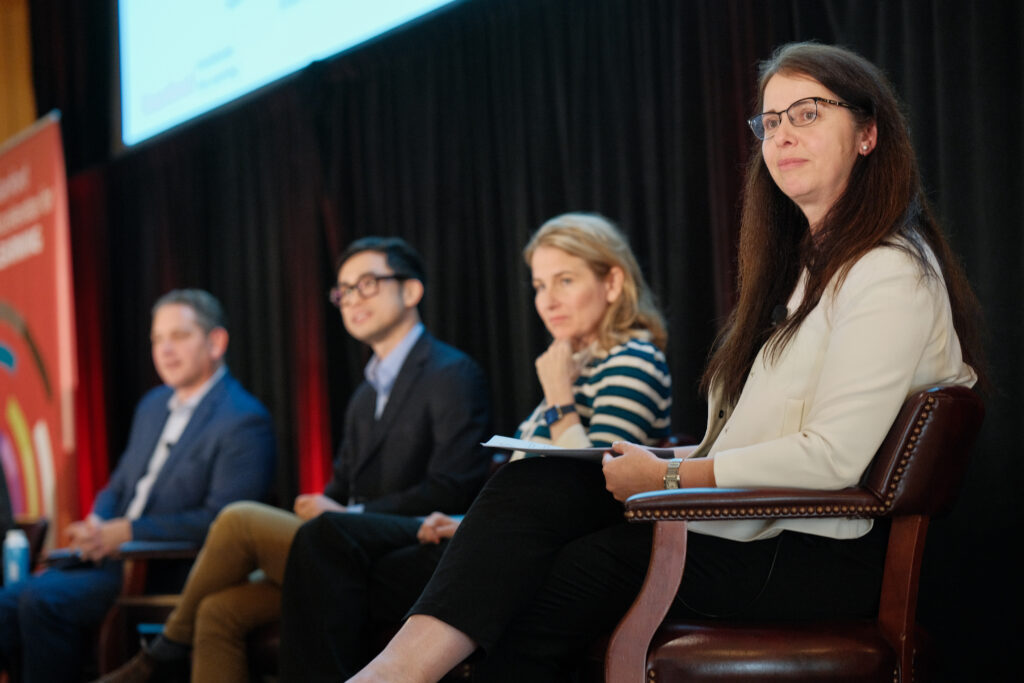
There were several examples of successful collaborations represented at the conference, including the relationship between Goodnotes and GSE Professor Guillermo Solano-Flores, faculty affiliate at the Stanford Accelerator for Learning. Goodnotes, a digital note-taking app with 24 million monthly users, sponsors research that then informs their product development. With Solano-Flores’ input, the app is expanding from note-taking to teaching and assessment.
“We are guided by his research, and teachers and students will be better served because of it,” said Minh Ngan Tran, vice president of operations and academic affairs at Goodnotes, who flew from Hong Kong to California for just six hours to speak at the conference. “Ultimately, we are going to have a better product.”
How can Stanford students build careers with impact in edtech?
Stanford students from the GSE, the School of Engineering, the Graduate School of Business, and the Freeman Spogli Institute for International Studies attended the conference, underscoring the interdisciplinary nature of the edtech sector. Two breakout sessions were designed specifically for students: “Education entrepreneurship 101: What I wish I’d known when starting,” and “How to build a successful career in edtech.”
The latter included a panel of edtech leaders sharing a transferable skill they developed early in their careers that enabled their success. Beth Schmidt, founder and CEO of Uppercase, cited teaching as helping her gain the skills to listen, understand others’ needs, analyze data, and adapt based on these inputs. For Dylan Arena ‘01, PhD ‘12, vice president of learning and data science at McGraw Hill, doing an interdisciplinary major in symbolic systems when he was an undergraduate at Stanford meant he was constantly in rooms with people with more content knowledge than him; picking up key information quickly and finding connections with other disciplines was crucial to his future success. Meanwhile, Alex Bernadotte, MA ‘07, founder and CEO of Beyond 12, encouraged students to “be married to a problem, not a solution,” and to continuously iterate with input from users in order for the product to have a lasting, deep impact on the field of education.
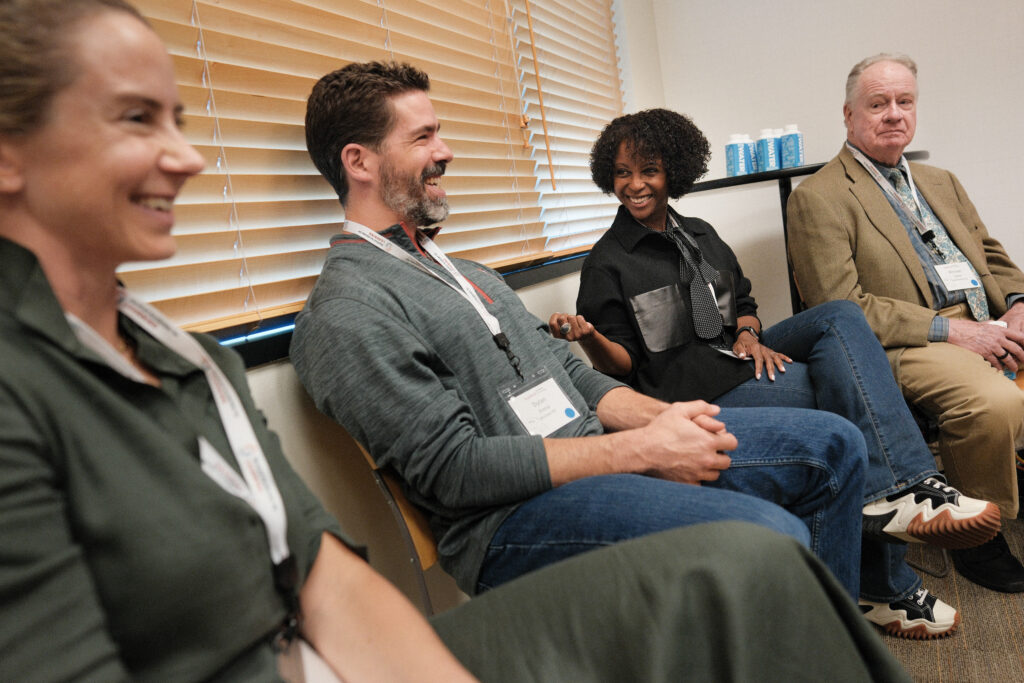
Looking to the future, together
As at the notable edtech conference ASU+GSV, the panels were just one part of the event experience; participants networked throughout, posted on social media with takeaways and insights they’d gained, and joined small group dinners off campus at the end of the day.
The convening brought to life the Accelerator’s approach: building upon the science of learning across disciplines, exploring the big questions that emerge from the influx of data and technology, facilitating the exchange of ideas between siloed stakeholders, and developing partnerships as a mechanism to get research-backed solutions to learners.
After jokingly responding "Who knows?" to Schwartz's question about the future, Carvalho shared his vision for the future of learning at LAUSD. “Every student should have an individualized plan, not just students with disabilities,” he declared. Under his leadership, LAUSD is developing the “Individualized Acceleration Plan,” a tech platform and app that supports students through personalized and gamified learning, shares progress updates with parents and teachers, and helps leaders make informed decisions. He envisions a future of schooling that is personalized, data-driven, and not bound by time and space. “I think the ‘classroom’ will be more of an environment, or an ecosystem.”
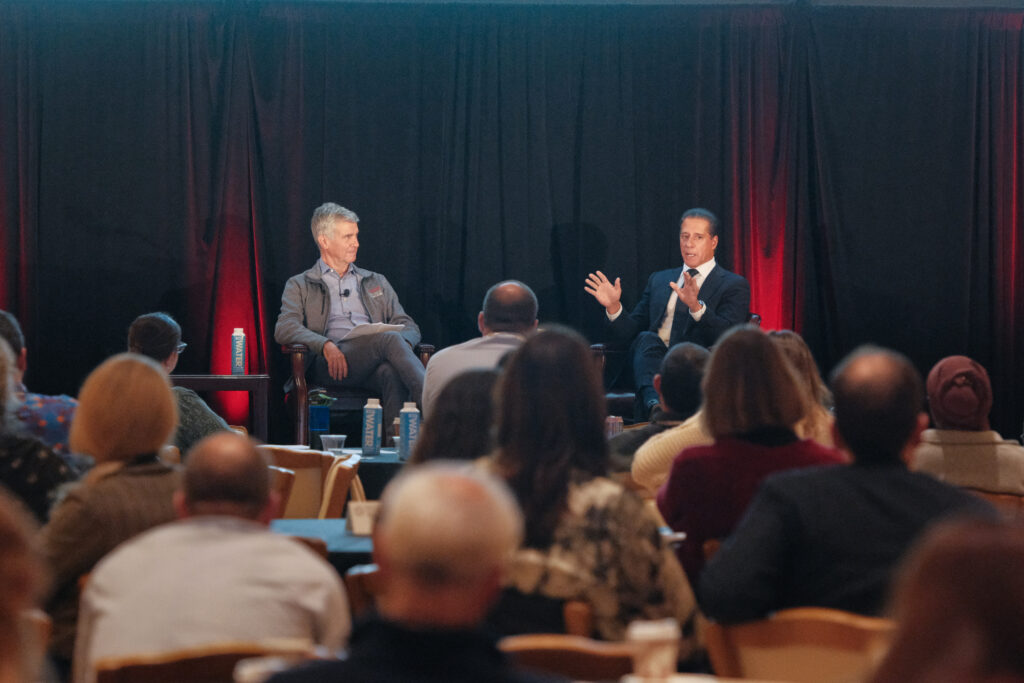
Babak Mostaghimi, assistant superintendent of Gwinnett County Public Schools in Georgia – the twelfth-largest district in the United States and the seventh-most diverse county in the country – also framed the day in terms of what the future might look like for learners in his district, with the help of research and edtech. Knowing Latin used to be the signifier of an educated citizen, Mostaghimi said, questioning the usefulness of that knowledge.
“We need to make sure that edtech isn't solving yesterday’s problem – the things that don’t really matter as much anymore,” he said. “The core part of education should be getting the key pieces of content knowledge that allow you to solve problems that matter for you and your community. What I’m hopeful for is that when we think about the future, for every kid, we ask, ‘What do they need in order to be extremely successful in the life that they are going for?’ ”
Learn more about the Accelerate Edtech Impact convening and view event video here.
Photo credit to Ryan Zhang.
